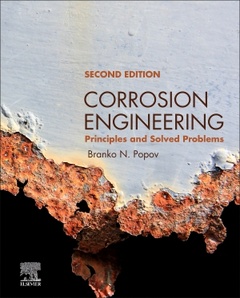Description
Corrosion Engineering (2nd Ed.)
Principles and Solved Problems
Author: Popov Branko N.
Language: English
Subject for Corrosion Engineering:
Keywords
<; p>; Corrosion; protection systems; passivity; corrosion theory; electrochemistry; thermodynamics; mechanical; bioengineering; civil engineering; electrochemical kinetics; metal interface; hydrogen damage; hydrogen embrittlement; stress corrosion cracking; hydrogen-induced cracking; atmospheric corrosion; pitting and crevice corrosion; stress corrosion cracking; corrosion measurements; galvanic corrosion; metal passivity; high temperature corrosion; corrosion of structural concrete; organic coatings-corrosion protection; cathodic protection; hydrogen damage; hydrogen embrittlement; stress corrosion cracking; hydrogen-induced cracking; hydrogen-enhanced decohesion; mechanisms of hydrogen degradation of metals; hydrogen-enhanced localized plasticity; hydrogen permeation; hydrogen diffusion; corrosion prevention; Tribology; design; materials degradation; process monitoring; environmental damage; materials costing<; /p>
1036 p. · 19x23.3 cm · Hardback
Description
/li>Contents
/li>Biography
/li>Comment
/li>
Corrosion Engineering: Principles and Solved Problems, Second Edition gives a comprehensive overview and introduction to the field through an extensive theoretical description of the principles of corrosion theory, passivity and corrosion prevention strategies and design of corrosion protection systems. The second edition has been thoroughly updated with new knowledge and includes solved corrosion case studies, corrosion analysis and solved corrosion problems to help the reader to understand the corrosion fundamental principles from thermodynamics and electrochemical kinetics, the mechanism that triggers the corrosion processes at the metal interface and how to control or inhibit the corrosion rates. A key goal of the updated book is to help the next generation of engineers and scientists: (i) understand the theory of hydrogen embrittlement and stress corrosion cracking as well as hydrogen damage prevention strategies, (ii) design models for developing hydrogen damage-resistant alloys, and (iii) prevent damage of different industrial components due to the presence and localization of hydrogen in metals. To accomplish these objectives, the book offers case studies of hydrogen permeation, hydrogen embrittlement, mechanical properties of alloys, and hydrogen damage control. The book covers the multidisciplinary nature of corrosion engineering through topics from electrochemistry, thermodynamics, mechanical, bioengineering, and civil engineering as well as materials science. It will appeal to students and instructors studying or teaching upper undergraduate/graduate level courses as well as researchers, and engineers in industry across these areas.
1. Evaluation of Corrosion 2. Thermodynamics in the Electrochemical Reactions of Corrosion 3. Electrochemical Kinetics of Corrosion 4. Passivity 5. Basics of Corrosion Measurements 6. Galvanic Corrosion 7. Pitting and Crevice Corrosion 8. Hydrogen Permeation and Hydrogen-Induced Cracking 9. Stress Corrosion Cracking 10. Hydrogen Entry into metals and alloys 11. Mechanisms of Hydrogen Degradation on 12. Atmospheric Corrosion 13. High-Temperature Corrosion 14. Corrosion of Structural Concrete 15. Organic Coatings 16. Corrosion Inhibitors 17. Cathodic Protection
In the last four years, his work at University of South Carolina led to research grants of $10M from the government and industry. During his seventeen years of service at USC and as the Director of the Centre for Electrochemical engineering. his research group has published 220 peer-reviewed articles, 52 proceeding volume articles, and 13 book chapters. His research group presented more than 220 conference papers on the National and International Conferences organized globally. His research group presented more than 235 conference papers on the National and International Conferences organized globally. He has received funding from DOE, NSF, ONR, ARMY, Reconnaissance Office, NRO, NASA, AESF, DOT and private companies. Dr. Popov has been included in the lists in 2014 and 2015 of ISI Highly Cited Researchers, which represents a world’s leading scientist, according to Tomson Reuters. According to Scholar Commons, his papers were accessed more than 53,500 times.
- Addresses corrosion theory, passivity, material selections and designs
- Extensive coverage of corrosion engineering protection strategies
- Contains over 500 solved problems, diagrams, case studies and end-of-chapter exercises
- Suitable for advanced/graduate corrosion courses as well as self-study reference for corrosion engineers
New to this edition:
- New chapters focusing further on the key topic of hydrogen corrosion: its entry into metals and alloys and the manifestation of hydrogen embrittlement, as well as the mechanisms of hydrogen degradation on metals

